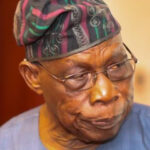The Central Bank of Nigeria (CBN) faces a significant liquidity crisis in supporting the naira, and must embark on more borrowing as a way out.
This is on the heels of nearly $20 billion of its $33 billion in foreign reserves is tied up in various derivative deals.
This is according to the Economist Intelligence Unit (EIU) in its latest Country Report on Nigeria, highlighting the precarious position of the naira amidst rising inflation and policy decisions that may further affect the currency’s stability.
The report read:
“For most of this year, the naira will be highly volatile, leading to regulatory erraticism that can affect businesses, especially those holding foreign currency.
“The CBN lacks the liquidity to support the naira itself; out of US$33bn in foreign reserves, a large share (estimated at nearly US$20bn), is committed to various derivative deals.”
The EIU also suggests that foreign borrowing will be essential to rebuild the CBN’s reserves, clear backlogs of unmet foreign exchange orders, and restore confidence in the naira.”
It further stated::
“Our view is that it will take foreign borrowing to rebuild the CBN’s buffers, fully clear a backlog of unmet foreign exchange orders and restore confidence. This is probably only achievable towards the end of 2024.”
Notably, Nigeria has already taken steps in this direction, securing a $3.3 billion loan from the African Export-Import (Afrexim) Bank and a $1 billion loan from the African Development Bank, with an additional $1.5 billion sought from the World Bank.
The CBN is also working with the International Monetary Fund (IMF) to create a framework to address excess volatility in the forex market.Naira may crash to N2,381/$ by 2028 over lax policies
The EIU further projects a gradual recovery of foreign reserves between 2024 and 2028, albeit with a cautious outlook on the naira’s valuation.
Following a significant devaluation in early February, further depreciation is expected due to persistently high inflation and negative real short-term interest rates.
However, the report holds a balanced forecast, predicting an end-2024 rate of N1,770/$ and N1,817/$ by the end of 2025.
Despite this, concerns remain about the long-term value of the naira, with projections indicating a potential slide to N2,381/$ by 2028 and that the spread with the parallel market will be 5-15%, reflecting the impact of a lax monetary-fiscal policy mix and fluctuating world oil prices.
The report anticipates a volatile year for the naira, with potential regulatory changes that could impact businesses, especially in the face of foreign currency holdings.
The report underscores the dilemma faced by the CBN, noting that despite an increase in the policy rate in February, the overarching economic goals set by President Bola Tinubu, including a notable aversion to high-interest rates and the ambition to double GDP by 2031, may hinder the necessary monetary tightening to attract foreign investors.
This scenario is exacerbated by high inflation rates, eroding the real value of short-term interest rates and potentially leading to higher unemployment if aggressive monetary policies are adopted.










More Stories
Military air strikes kill several terrorists in failed attack on Marte
Pastor’s driver mauls four siblings to death with pestle
Tinubu seeks Reps’ approval for $21.5bn external loan, ₦757.9bn pension bond